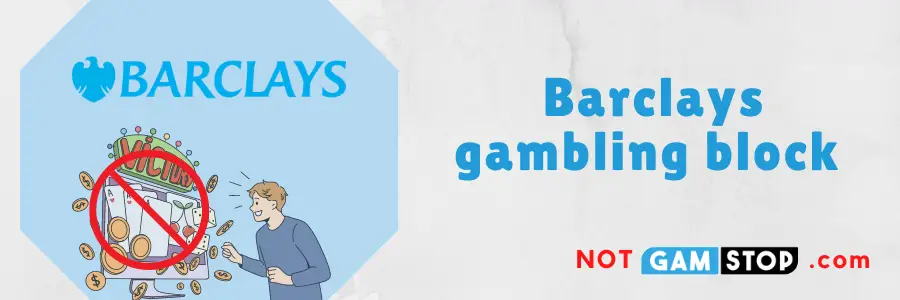
The betting blocker on the Barclays app is a feature that allows the bank’s customers to control their gambling spending. This feature allows customers to actively block gambling transactions directly through their bank accounts and credit cards. Once the blocking is activated, all attempts to make payments to gambling platforms will be automatically rejected. For those who are interested in more extensive measures, we offer additional strategies for effectively block gambling sites on various platforms.
Customers can activate this feature through the Barclays mobile app or online banking, making the process of managing access to gambling simple and convenient. Additionally, the blocking feature is designed to provide customers with a “cooling-off period” during which they can reconsider their intentions to participate in gambling.
How to block gambling on Barclays app
If you are concerned about your gambling expenses or want to prevent the possibility of such expenses, Barclays offers a simple solution through its mobile app. Here’s how you can activate the can Barclays block gambling feature:
To activate the gambling block through the Barclays app and help control gambling and betting expenses, you can use our instructions below, or visit the Barclays website for more detailed guidance here:
- Open the Barclays app on your mobile device. Make sure you have the latest version of the app installed to take advantage of all available features.
- Go to the “Card Management” section. On the main screen of the app, find and select the “Your Cards” option or a similar section where all your debit and credit cards are displayed.
- Select the card for which you want to activate the block. If you have multiple cards, choose the one for which you want to set gambling restrictions.
- Find the “Merchant Blocking” option. In this section, you will see various merchant categories that you can block or allow transactions for.
- Activate the gambling block. In the list of categories, find “Gambling” or a similar item related to gambling activity. Use the toggle switch to activate the block.
- Confirm the changes. After enabling the block, you may need to confirm the action with a PIN code or biometrics to ensure the security and privacy of your settings.
- Close the settings and save the changes. After activating the block, all attempts to make transactions related to gambling will be automatically declined with this card.
This feature is part of Barclays’ initiative to support responsible gambling. In addition to transaction blocking, Barclays also offers access to consultants trained by GamCare and free use of the Gamban software to block gambling websites.
How to bypass Barclays gambling block
To bypass the Barclays gambling block, you might find methods similar to those used for bypassing Gamstop. Essentially, these methods involve using different financial tools or systems to avoid detection by the bank’s gambling transaction block. Here’s a brief overview:
- Use of Cryptocurrencies: Using cryptocurrencies like Bitcoin for transactions can bypass traditional banking channels completely since they do not go through conventional banks.
- Prepaid Cards: Some users opt for prepaid cards, which can be loaded with funds and used for gambling without being directly linked to a bank account.
- E-Wallets: Services like PayPal, Skrill, or Neteller offer a layer of separation between your bank and gambling sites. These can sometimes evade the gambling blocks if not specifically restricted.
- Bank Transfers to a Secondary Account: Transferring funds to a secondary bank account not linked to a gambling block can be another way to circumvent restrictions.
For more detailed methods similar to these, you can refer to discussions on bypass Gamstop guide.
Note, however, that attempting to bypass Barclays’ gambling block or similar bank restrictions is typically not recommended as it can lead to potential financial risks and does not address issues related to gambling addiction.
How Barclays can help our clients
Barclays offers various tools and services aimed at supporting customers who want to control their gambling spending. Understanding that gambling can become a serious issue for some customers, the bank has developed a range of measures to help manage finances and reduce the risks associated with gambling addiction.
Gambling Blocking
Barclays provides a gambling transaction blocking feature that allows customers to stop the ability to make payments to gambling platforms with a single click through the mobile app or online banking. This feature now includes a 72-hour cooling-off period during which customers cannot resume gambling transactions, giving them time to reconsider their decision. If you are concerned about how self-exclusion can affect your financial situation, including your credit rating, you can find more information in the article does self-exclusion affect credit rating.
Transaction Limits
Customers can set individual spending limits on their debit and credit cards, helping them control daily or monthly expenses and prevent substantial financial losses due to gambling.
Temporary Card Blocking
In cases where customers feel their spending is getting out of control, they can temporarily freeze their bank cards through the app, instantly blocking all purchases and cash withdrawals.
Educational Resources and Support
Barclays offers access to educational materials and resources on financial management, helping customers better understand and manage their financial habits. The bank also collaborates with organizations like GamCare and GAMSTOP, providing information and support for those affected by gambling issues.
Consultations and Specialized Assistance
Customers in need of additional support can reach out to Barclays’ customer service, where they will be provided with information on specialized support and treatment services for addictions.
Barclays partners with GamCare and provides free access to Gamban software, enhancing the tools available to manage gambling activities effectively. Understand more about these and other preventive measures at the UK Gambling Commission’s detailed guide.
